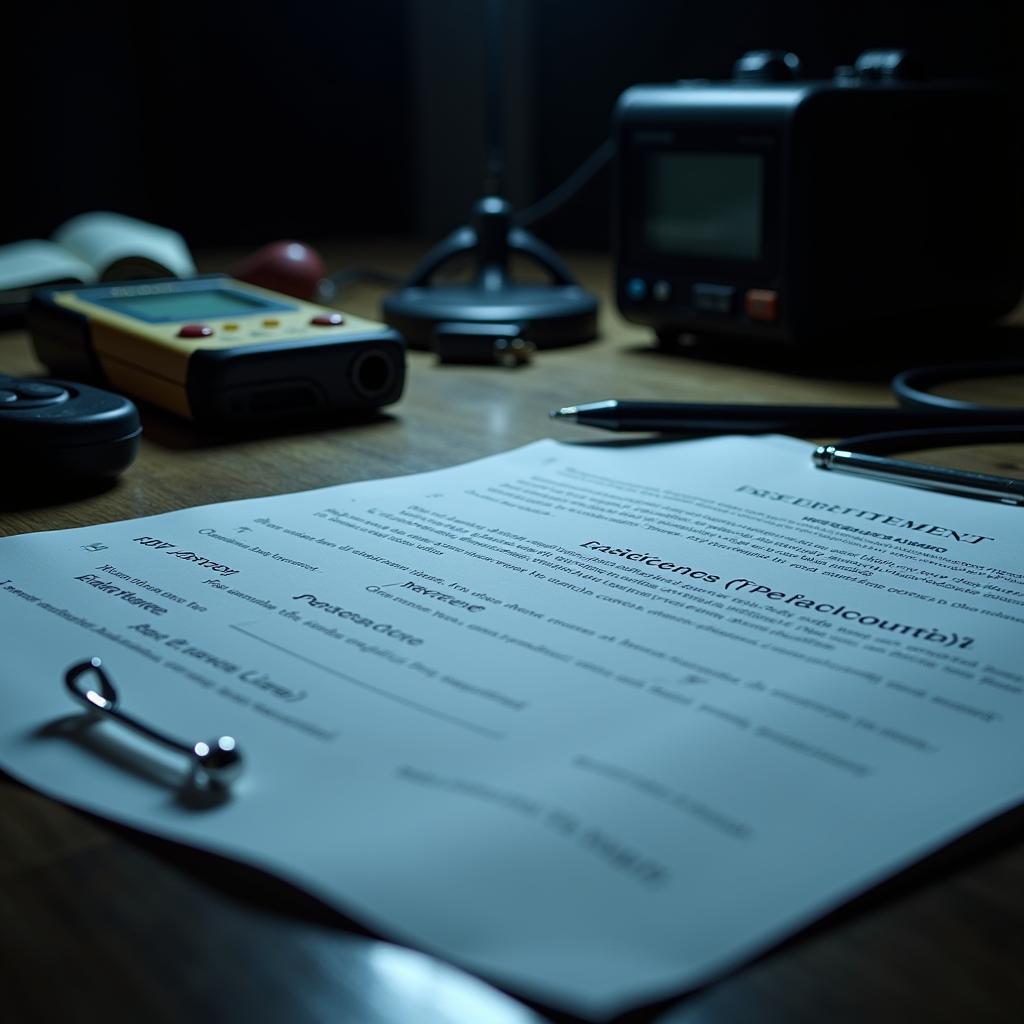Research consent forms are crucial for any investigation, especially when delving into the often sensitive realm of paranormal research. Understanding how to create and implement a comprehensive Research Consent Form Example is paramount for ethical practice and ensuring participant protection. This guide explores the importance of these forms in paranormal research and provides practical examples.
Informed consent is the bedrock of ethical research. It signifies that participants understand the nature of the research, their rights, and any potential risks involved before voluntarily agreeing to participate. In paranormal investigations, where the subject matter can be particularly sensitive and sometimes frightening, a well-crafted research consent form example is even more critical. It’s a vital tool for building trust and maintaining transparency, letting participants know exactly what they are getting into. Having a robust research consent form example also protects the researcher from potential legal issues. See our guide on building a research design assignment.
Why are Research Consent Forms Essential in Paranormal Investigations?
Paranormal research often deals with personal experiences, beliefs, and sometimes deeply held fears. Obtaining informed consent acknowledges the participant’s vulnerability and respects their autonomy. This is essential not only for ethical reasons but also for fostering a safe and cooperative environment conducive to meaningful research.
Key Elements of a Research Consent Form Example for Paranormal Studies
A solid research consent form for paranormal research should include:
- Purpose of the research: Clearly explain the study’s aims and objectives.
- Procedures: Describe the methods to be used, including any equipment (EMF meters, audio recorders, etc.) and the types of data to be collected.
- Risks and benefits: Outline potential psychological or emotional impacts and any potential benefits of participation. In paranormal research, acknowledging the potential for unsettling experiences is crucial.
- Confidentiality: Detail how participant data will be stored, used, and protected. Anonymity and data security are paramount. For further information on confidentiality, check out our article: how to maintain confidentiality in research.
- Voluntary participation: Emphasize that participation is entirely voluntary and that participants can withdraw at any time without penalty.
- Contact information: Provide contact details for the research team and an independent ethics committee (if applicable) for queries or concerns.
 Research Consent Form Example for Paranormal Investigation
Research Consent Form Example for Paranormal Investigation
Designing a Research Consent Form Example: Step-by-Step Guide
Creating a research consent form involves careful consideration of various factors. Here’s a step-by-step guide:
- Identify the specific aims of your paranormal investigation.
- Outline all research procedures and the data you intend to collect.
- Assess potential risks and benefits for participants.
- Draft the consent form using clear, concise, and easy-to-understand language.
- Review the draft with legal counsel or an ethics committee.
- Obtain signed consent forms from all participants before commencing the investigation.
 Paranormal Researcher Reviewing Consent Form
Paranormal Researcher Reviewing Consent Form
Research Consent Form Example: Addressing Specific Paranormal Scenarios
Different paranormal investigations may require tailored consent forms. For instance, research involving alleged hauntings might necessitate addressing potential emotional distress, while investigations of psychic phenomena might require specific clauses regarding data interpretation and confidentiality. For more detailed information on qualitative research protocols, refer to our guide on interview protocol qualitative research.
“A well-structured research consent form example protects both the participant and the researcher, ensuring ethical and transparent research practices,” notes Dr. Emily Carter, a leading researcher in paranormal psychology.
What About Deception in Paranormal Research?
Deception in research, while sometimes used in psychological studies, raises ethical concerns. In paranormal research, deceiving participants about the nature of the study or the methods used can erode trust and compromise the integrity of the findings. Transparency is crucial. Learn more about deception in research in our article: what is the purpose of using deception in psychological research.
Conclusion: The Importance of Ethical Practice in Paranormal Research
A comprehensive research consent form example is a cornerstone of responsible paranormal research. It ensures ethical practice, protects participants, and fosters trust. By prioritizing informed consent, researchers uphold the integrity of their work and contribute to a more credible and respectful field of study. Using a research consent form example is crucial for any paranormal investigation.
FAQ
-
Why is a research consent form necessary?
- It protects participants’ rights and ensures ethical research practices.
-
What should be included in a paranormal research consent form?
- Purpose, procedures, risks/benefits, confidentiality, voluntary participation, contact info.
-
Can a participant withdraw from a study after signing the consent form?
- Yes, at any time without penalty.
-
What if a participant experiences distress during a paranormal investigation?
- The research protocol should address this, allowing for immediate cessation and support.
-
Who should review the research consent form before it is used?
- Legal counsel or an ethics committee.
-
Is deception ever acceptable in paranormal research?
- It raises serious ethical concerns and should generally be avoided.
-
Where can I find more resources on research ethics?
- Professional organizations and university research ethics boards.
For assistance with your Paranormal Research, contact us:
Phone: 0904826292
Email: research@gmail.com
Address: No. 31, Alley 142/7, P. Phú Viên, Bồ Đề, Long Biên, Hà Nội, Việt Nam.
Our customer service team is available 24/7. We also recommend checking out our guide on qualitative research a guide to design and implementation.